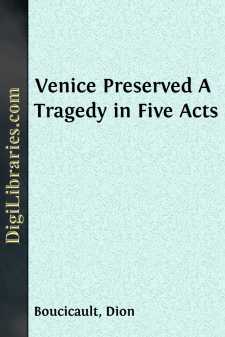Categories
- Antiques & Collectibles 13
- Architecture 36
- Art 48
- Bibles 22
- Biography & Autobiography 813
- Body, Mind & Spirit 138
- Business & Economics 28
- Children's Books 12
- Children's Fiction 9
- Computers 4
- Cooking 94
- Crafts & Hobbies 4
- Drama 346
- Education 46
- Family & Relationships 57
- Fiction 11821
- Games 19
- Gardening 17
- Health & Fitness 34
- History 1377
- House & Home 1
- Humor 147
- Juvenile Fiction 1873
- Juvenile Nonfiction 202
- Language Arts & Disciplines 88
- Law 16
- Literary Collections 686
- Literary Criticism 179
- Mathematics 13
- Medical 41
- Music 40
- Nature 179
- Non-Classifiable 1768
- Performing Arts 7
- Periodicals 1453
- Philosophy 64
- Photography 2
- Poetry 896
- Political Science 203
- Psychology 42
- Reference 154
- Religion 505
- Science 126
- Self-Help 81
- Social Science 81
- Sports & Recreation 34
- Study Aids 3
- Technology & Engineering 59
- Transportation 23
- Travel 463
- True Crime 29
Venice Preserved A Tragedy in Five Acts
by: Dion Boucicault
Description:
Excerpt
EDITORIAL INTRODUCTION.
The story of "Venice Preserved" is partly founded upon St. Real's History of the Conspiracy of the Spaniards against the Republic of Venice, in 1618. Voltaire compares the author of this History to Sallust; and pronounces it superior to the English tragedy—an assertion, which, like many others from the same source, was the convenient sentence of an adroit but reckless ignorance. The merits of St. Real are undoubtedly great; but Otway's indebtedness to him is exceedingly slight; and it is remarkable to see how ingeniously, from a few meagre historical details, the great dramatist has constructed one of the noblest imaginative works of which literature can boast. The names of nearly all the dramatis personæ with the exception of Belvidera, are taken from St. Real; but their characters are Otway's, and his plot is almost wholly original. The true Pierre was a Norman corsair, who had accumulated a fortune by plundering ships in the Mediterranean. He was eventually strangled on board his own ship by order of the Venetian Senate. Jaffier was of Provence, and appears to have engaged in the plot against the state from his friendship for Pierre, and the prospect of gain. History says nothing of his wrongs, or his love for the daughter of Priuli; and he was shaken in his faith to the conspiracy, not by the tears of a woman, but partly by nis detestation of the sanguinary speech of Renault (in which Otway follows the history), and partly from being struck with compunction during the spectacle of the Doge's wedding the Adriatic, when his imagination contrasted the public rejoicings with the desolation which was to follow. After disclosing the plot, and experiencing the perfidy of the Senate, who had promised him the lives of his friends, he was made captive while bearing arms against Venice, and drowned the day after his arrival in the city. Renault, according to St. Real, was an old French gentleman, who had fled to Venice for some unknown cause, and there became acquainted with the Marquis de Bedmar. Though poor, he esteemed virtue more than riches, and glory more than virtue. He had abilities, courage, a contempt for life, and a passion for distinction. The affront towards Belvidera, of which Otway makes him guilty, was a pure invention of the author, unsupported by any trait which history ascribes to Renault.
Few plays owe so much to the pruning-knife for their success as this. In its unexpurgated state, "Venice Preserved" leaves an impression far less favorable to the genius, as well as the moral sense of the author, than in its present abridged and rectified shape. In the language of Campbell, "never were beauties and faults more easily separated than those of this tragedy. The latter, in its purification for the stage, came off like dirt from a fine statue, taking away nothing from its symmetrical surface, and leaving us only to wonder how the author himself should have soiled it with such disfigurements. Pierre is a miserable conspirator, as Otway first painted him, impelled to treason by his love of a courtesan and his jealousy of Antonio....



